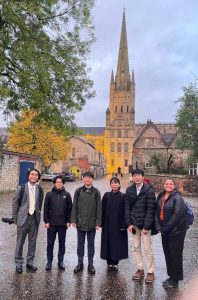 As part of their training, Japanese local government staff seconded to JLGC visited several local authorities, including Stevenage, East Suffolk and Hammersmith and Fulham, to learn about advanced initiatives in the UK. The following is a report on each visit from their perspective. (Reports about the October visit to Hartlepool and January’s visit to Teignbridge were published in previous newsletters – links to these reports can be found at the end of this article.)
As part of their training, Japanese local government staff seconded to JLGC visited several local authorities, including Stevenage, East Suffolk and Hammersmith and Fulham, to learn about advanced initiatives in the UK. The following is a report on each visit from their perspective. (Reports about the October visit to Hartlepool and January’s visit to Teignbridge were published in previous newsletters – links to these reports can be found at the end of this article.)
Stevenage
Stevenage Borough Council explained their Healthy Hub programme, which aims to extend life expectancy, and their mental health support programme, Night Light.
Recently there has been renewed interest in prevention initiatives that tackle physical and mental health problems before visiting medical services. For example, the Night Light initiative shows that mental health professionals and specialist services are not always needed to take preventive steps for suicide and mental health problems.
Although talking with someone can be a source of comfort, in the UK loneliness and isolation are becoming social problems and many people live alone without interacting with those around them. Night Light offers comprehensive services which can be used whenever by anyone, such as a telephone service and café which runs during the night, a place where someone listens, a service providing a warm welcome and offers of accommodation. It is an excellent example for Japanese local authorities as it plays a vital role for isolated people in need of help and reduces the burden on strained health care services.
Norwich
JLGC staff visited the New Anglia Local Enterprise Partnership, based in Norwich, and other related organisations. They also spoke to senior staff from East Suffolk Council (including outgoing chief executive Stephen Baker, an alumnus of our own Japan Study Tour), just outside of Norfolk. Whenever JLGC staff visit local authorities in the UK, unlike in Japan, local government officials can exchange opinions freely and openly, regardless of their position. When East Suffolk Council made decisions, many council members gathered to discuss and plan future strategies. This democratic discussion is refreshing and shows many ways for local authorities to plan project strategies.
Furthermore, Norwich faces similar challenges to many local authorities in Japan. It tackles these issues with tenacity. The local authority holds a Hackathon event every year, and UK municipalities help more winners establish their businesses than Japanese authorities. JLGC staff heard about the active collaboration with industry, government, and academia from the early stages of conceptualising business plans, management and marketing strategies. Providing vital support to event winners until their businesses are established was also discussed. UK authorities are more enthusiastic about this policy than Japanese local authorities.
White City
JLGC staff heard from Upstream, a partnership between the London Borough of Hammersmith and Fulham and Imperial College London on our visit to West London. They visited facilities involved in the borough’s and university’s collaborative industrial revitalisation projects, research and business generation to create new technologies.
White City Innovation District staff talked about authorities as flagships of economic growth, university organisations working with authorities to promote cutting-edge research and collaborations between the university and local authorities. A real estate company that develops property in the area, Mitsui Fudosan, was also part of the discussion. JLGC staff learnt about examples of promoting large-scale economic growth beyond government-only responses when local authorities work with relevant agencies. It was a valuable experience to learn about a positive cycle in which local authorities consult with related organisations and then decide and announce a growth strategy that sets the area’s goals. Private companies then enter the market, increasing the potential for economic growth. Therefore, related organisations attracted by that potential enter the market and further stimulate economic growth.
As local government officials, JLGC staff were impressed by the importance of playing a leading role in identifying a region’s potential and leading a plan that can use these assets while considering the wishes of residents and private organisations. In this way, local government workers can contribute to regional development by reflecting the voices of stakeholders and residents in regional policy.
・Training with local authorities
– Hartlepool: https://www.jlgc.org.uk/en/news_letter/training-with-local-authorities-hartlepool/
– Exeter, Teignbridge: https://www.jlgc.org.uk/en/news_letter/staff-training-exeter-and-teignbridge/

